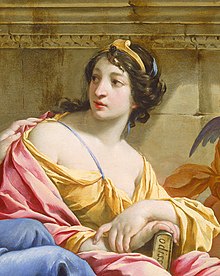
Back كاليوب Arabic Kalliopa Azerbaijani Каллиопа Bashkir Каліёпа Byelorussian Каліёпа BE-X-OLD Калиопа Bulgarian Kalliope Breton Kaliopa BS Cal·líope Catalan Kalliopé Czech
| Calliope | |
|---|---|
Goddess of Epic Poetry | |
| Member of the Muses | |
 Detail of painting The Muses Urania and Calliope by Simon Vouet, in which she holds a copy of the Odyssey | |
| Abode | Mount Olympus |
| Symbols | Lyre |
| Genealogy | |
| Parents | Zeus and Mnemosyne |
| Siblings | Euterpe, Polyhymnia, Urania, Clio, Erato, Thalia, Terpsichore, Melpomene and several paternal half-siblings |
| Consort | Apollo, Oeagrus, Zeus |
| Children | Orpheus, Linus, the Corybantes |
In Greek mythology, Calliope (/kəˈlaɪ.əpi/ kə-LY-ə-pee; Ancient Greek: Καλλιόπη, romanized: Kalliópē, lit. 'beautiful-voiced') is the Muse who presides over eloquence and epic poetry; so called from the ecstatic harmony of her voice. Hesiod and Ovid called her the "Chief of all Muses".[1]

- ^ Hesiod, Theogony 79–80: This belief in the goddess's identity, however, really cannot be proved from the text of the Iliad, because there is no evidence as to the referent of θεά (goddess). Neither Kirk nor Leaf makes such a claim in their commentaries on the Iliad. They simply say that she is "the Muse" (Μοῦσα). Kirk does say that it was conventional for Muses to invoked at the beginning of oral poems, since the process of the oral tradition was for the Muse to "sing" through the singer. See G. S. Kirk, ed., Books 1–4, vol. I in The Iliad: A Commentary (Cambridge: Cambridge University Press, 1985), p. 51; and Walter Leaf, ed., Books I–XII, vol. I of The Iliad. 2nd ed. (London: Macmillan, 1900), p. 3.